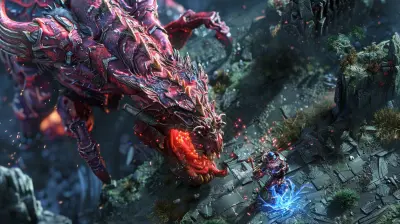The Art of Speed: Why Pacing Matters in Time Management Games
13 November 2025
Time management games are like the adrenaline junkies of the gaming world. They throw you into high-pressure situations where every second feels like an hourglass emptying at warp speed. Whether you're flipping burgers at an overcrowded diner, running a buzzing hospital, or operating a bustling airport, one thing remains constant: pacing is everything. But here’s the thing—it's not just about being lightning-fast. It's about managing that speed, knowing when to slow down, and finding your rhythm. That sweet balance is what separates pros from frustrated button-mashers.
So, why does pacing matter so much in time management games, and what can we learn from mastering this virtual art? Let me break it down for you.
What Are Time Management Games?
Before we dive into the nitty-gritty of pacing, let’s make sure we’re all on the same page about what time management games actually are. In simple terms, these games are all about multitasking under pressure. You’ve got limited time to complete tasks, and the better you manage your workload, the higher your score or reward.From classics like Diner Dash to newer hits like Overcooked or Cook, Serve, Delicious!, this genre has been around for years and continues to thrive because of its addictive nature.
But here’s the kicker: It’s not just mindless clicking. These games are basically crash courses in prioritization, strategy, and—most importantly—pacing. Just like in real life, if you tackle things without proper pacing, you’re setting yourself up for burnout, virtual or otherwise.
Why Pacing Is the Heart of Time Management Games
Let’s get real here: if you sprint through a marathon, you’re going to collapse halfway, right? Time management games teach you this lesson in the most fun (and sometimes infuriating) way. Here’s why pacing plays such a crucial role:1. Efficiency Over Chaos
When you start out in most time management games, it's tempting to go full speed ahead. The clock is ticking, tasks are piling up, and panic sets in. But if you rush blindly, what happens? Mistakes. Missed orders. Complaints from NPCs with grumpy faces. Sound familiar?Pacing helps you hit your stride. It’s about recognizing patterns and knowing when to go fast and when to slow down. Think of it like dancing: if you just flail around without rhythm, you're stepping on toes (or, in this case, burning virtual pizzas).
Take Overcooked, for example. Sure, you can rush to chop onions and fry burgers, but if you don’t communicate and coordinate with your team, it’s game over.
2. The Flow State Sweet Spot
Ever heard of the "flow state"? It's that magical zone where you’re fully immersed, focused, and everything just clicks. Good pacing helps you get there in time management games. When you’re not overwhelmed or under-stimulated, you find your rhythm and perform like a well-oiled machine.It’s like juggling—too many balls, and you’ll drop them all. Too few, and you’re just… tossing one ball in the air. Boring, right? Proper pacing ensures you’re juggling the perfect number.
3. Avoiding Burnout
Raise your hand if you’ve ever rage-quit a time management game because it felt impossible to keep up. (Yep, guilty over here.) That’s usually a pacing issue. If you don’t give yourself time to breathe, even in a virtual cafe, you’ll hit a wall.Games like Diner Dash or Two Point Hospital are designed to push you, but they also reward players who know when to prioritize and when to slow down. Sprinting the whole way through? It’s a recipe for disaster.
4. Mastering Multitasking
Pacing teaches you that not all tasks are created equal. Some need to be done NOW, while others can wait a few seconds. The beauty of pacing lies in knowing what deserves your immediate attention and what doesn’t.Imagine you’re playing a game where you’re running a theme park. Fixing a broken ride is more urgent than picking up litter, right? Pacing is all about these micro-decisions that keep the game (and your sanity) intact.
How Pacing Translates to Real Life
Here’s the cool part: what you learn about pacing in time management games can totally apply to real life. Think about it—don’t we all have tasks coming at us from every direction? Prioritizing, finding balance, and avoiding burnout aren’t just gaming skills; they’re life skills.Time management games mimic the chaos of real life but in a controlled environment. And hey, if you can handle a lunch rush at a virtual diner, you can probably tackle your inbox on a Monday morning, right?
Tips for Better Pacing in Time Management Games
So, how do you get better at pacing? Whether you’re a seasoned gamer or a total newbie, here are some tips to help you crush those time management challenges:1. Start Slow, Then Build Momentum
When you jump into a game, it’s tempting to hit the ground running. But take your time to learn the mechanics and spot patterns. Start slow. Once you’re comfortable, you’ll naturally pick up speed without feeling like your fingers are about to fall off.2. Prioritize Like a Pro
Not all tasks are urgent, even if they feel that way. Focus on the high-impact tasks first. In games like Cooking Dash, delivering food to the VIP customer matters more than serving the table with three stars over their heads.3. Stay Calm Under Pressure
Easier said than done, right? But freaking out doesn’t help. If you miss a task, it’s not the end of the world! Regain your composure, adjust your pace, and get back in the game. After all, even superheroes don’t save the world in one breath.4. Use Downtime Wisely
Most time management games give you little pockets of downtime—use them! Prep ingredients, restock supplies, or position characters strategically. It’s like preheating the oven before you start baking. Future you will thank you.5. Upgrade Strategically
Many time management games let you upgrade your tools or stations. Upgrades can make your life so much easier, so don’t ignore them. Faster ovens, extra hands, or better equipment can mean the difference between chaos and calm.A Closer Look: Games That Nail Pacing Mechanics
Some games absolutely shine when it comes to teaching players the importance of pacing. Here are a few standouts in the genre:1. Diner Dash
This is the OG of time management games. It’s fast-paced, frantic, and forces you to juggle multiple priorities. Pacing is crucial if you want those happy customers and fat tips.2. Overcooked
Co-op madness at its finest. Overcooked thrives on communication and teamwork, but good pacing is the secret sauce. Knowing when to delegate tasks (and when to take a deep breath) is key.3. Two Point Hospital
This quirky game is all about running a hospital without letting chaos take over. The trick? Managing your staff, patients, and upgrades at a pace that won’t leave you tearing your hair out.4. Cook, Serve, Delicious!
This game is pure multitasking mayhem. You’re responsible for cooking, serving, and managing upgrades. Go too fast, and you’ll mess up orders. Go too slow, and customers will lose patience. Talk about finding balance!Why You’ll Fall in Love with the Art of Pacing
There’s something intensely rewarding about mastering pacing in time management games. It feels like orchestrating a perfectly tuned symphony. And the best part? The skills you pick up—prioritizing, multitasking, keeping calm under pressure—spill over into your everyday life.So, the next time you’re sweating over a virtual kitchen or managing a faux hospital, remember: it’s not just about speed. It’s about rhythm, balance, and finding your flow.
all images in this post were generated using AI tools
Category:
Time Management GamesAuthor:

Jack McKinstry
Discussion
rate this article
1 comments
Elise McPhee
Great insights on pacing in time management games! Balancing speed with strategy truly enhances the gameplay experience, making it engaging and rewarding. Excited to see how developers innovate further!
November 16, 2025 at 4:06 PM

Jack McKinstry
Thank you! I'm glad you found the insights valuable. I’m excited to see how developers will continue to innovate in this space too!


